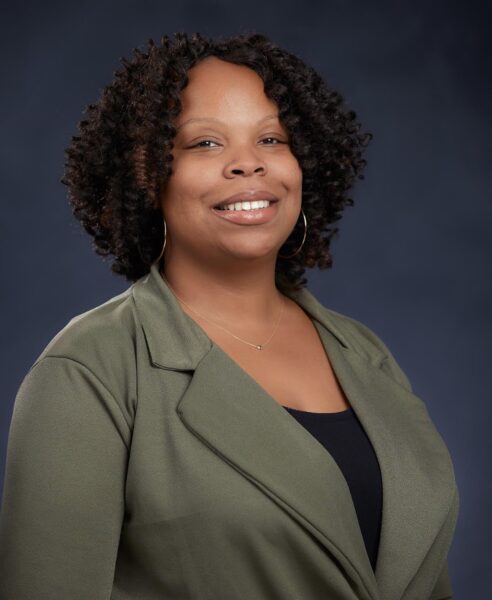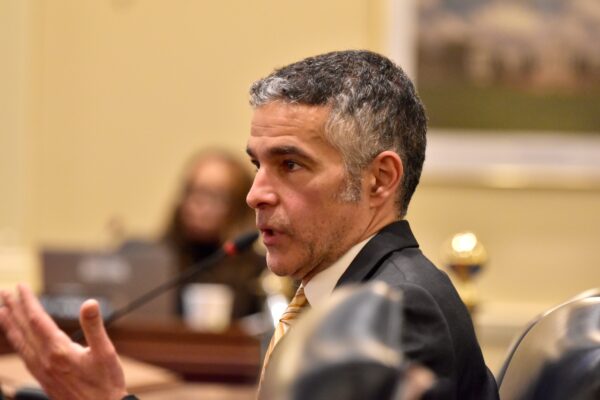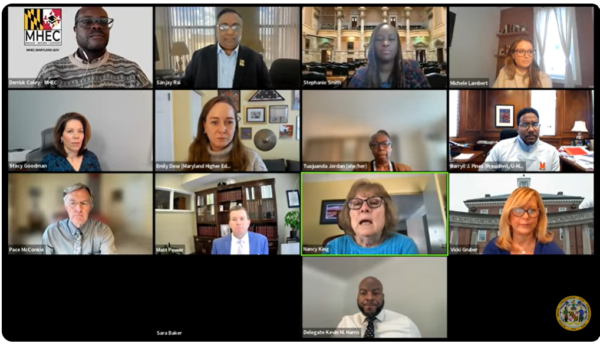News roundup: New environmental appointments, an advocacy group rebrands, assurances on elections, and higher ed reforms

The Maryland Department of the Environment (MDE) has hired its first assistant secretary for environmental justice.
Environment Secretary Serena McIlwain announced this week that Aneca Y. Atkinson is getting the job. Atkinson comes to the agency from National Audubon Society Mid-Atlantic, where she served as director of the organization’s Delaware River Watershed Program. Atkinson has also served in several roles with the Pennsylvania Department of Environmental Protection.
“Assistant Secretary Atkinson will lead the way as we reach out to communities that have disproportionately experienced pollution and put into place policies that ensure no one is left behind,” McIlwain said. “She knows how the system works and how we can focus critical resources and action toward communities that have historically been overlooked.”

Aneca Atkinson, assistant secretary at the Maryland Department of the Environment for environmental justice. Pennsylvania Department of Environmental Protection photo.
McIlwain and Gov. Wes Moore (D) have both said that environmental justice will be a critical component of MDE’s work. McIlwain and her team have been holding environmental justice listening sessions over the past several months in overburdened and underserved communities, including Turner Station, Curtis Bay, Cheverly, Langley Park and Eagle Harbor.
At the Audubon Society, Atkinson led work to incorporate science-driven policy, advocacy, conservation, and public engagement to increase funding for on-the-ground improvements to the Delaware River watershed — with a focus on communities that have historically been excluded from green spaces and other environmental amenities and protections.
In Pennsylvania, she managed erosion and sedimentation control and stormwater management programs. She also served as director of the Office of Program Integration, and, from 2018 to 2022, was deputy secretary overseeing the Office of Water Programs. She played a major role in developing and implementing the agency’s strategy and vision for diversity, equity, inclusion and justice.
“I can’t wait to get started on this path to making Maryland a cleaner, greener place to live for everyone,” Atkinson said. “The key to environmental justice is communication. We are listening to those who have been ignored in the past and taking action to give everyone the same access to a healthy environment.”
Atkinson earned a bachelors degree in engineering from Smith College and a masters in water resources and environmental engineering from Villanova University.
Bringing an MD perspective to EPA
Montgomery County Councilmember Evan Glass (D) has been appointed to the U.S. Environmental Protection Agency’s 37-member Local Government Advisory Committee. He’s one of 16 new members that the EPA announced this week.
The committee advises the EPA on climate policies and regulations, with an emphasis on local level impact and implementation. Its members serve as liaisons between the federal government and their local jurisdictions.
Glass is chair of the Montgomery County Council’s Transportation and Environment Committee. He is the only member on the EPA panel from Maryland.
“I am honored to serve on the EPA’s Local Government Advisory Committee and I look forward to working with leaders from across the country to develop climate policies that protect our communities and our planet,” said Glass, who applied for the appointment. “It is imperative that local leaders are engaged in the federal policymaking process as we work to address the climate emergency we are experiencing.”
EPA said that this year, the committee is expected to provide input on the agency’s strategy for reducing plastic pollution, proposed regulatory updates for reducing lead and copper in drinking water, and efforts to improve community-level communication and engagement on climate change issues.
“Councilmember Glass brings an important perspective to the Local Government Advisory Committee, and will be instrumental in guiding EPA policy and effects on local governments,” said EPA Mid-Atlantic Regional Director Adam Ortiz — himself a Maryland guy.
Name change for immigration services organization
The Lutheran Immigration and Refugee Service, the international faith-based nonprofit based in Baltimore, has rebranded. After 85 years as LIRS, the organization is changing its name to Global Refuge.
“We are thrilled to embark on an exciting new chapter rooted in our profound purpose, rich history, and enduring commitment to walking faithfully alongside newcomers at every stage in their journey,” Krish O’Mara Vignarajah, the organization’s president and CEO, said in a statement. “The word ‘Global’ not only describes the diverse backgrounds of the children and families we serve, but also conveys the scale of our vision to grow our humanitarian leadership as a beacon of hope and welcome. ‘Refuge’ is inspired by our Lutheran heritage and conveys a meaning of shelter that extends across all people, faiths, and denominations, just as our work does. At its core, our new name speaks to the place we are creating for immigrants, refugees, and asylum seekers in need, the world over.”
In honor of the nonprofit’s transformation, Baltimore Mayor Brandon Scott (D) proclaimed Wednesday as Global Refuge Day in the city, and urged residents to renew their “commitment to welcoming and championing the cause of immigrants, asylum seekers, and refugees.”
Accompanying the launch of the Global Refuge brand is a new website a modernized logo, inspired by the Statue of Liberty’s torch. The organization has more than 550 employees worldwide.
DeMarinis says board won’t be deterred by Ayala resignation
Maryland’s top election administrator said the recent resignation of a board member who faces charges related to the January 6 attack on the U.S. Capitol will not prevent the agency from proper administration of the coming presidential election.
Carlos Ayala, one of two Republicans on the five-member board, resigned last week after federal prosecutors announced he had been charged with a felony and misdemeanors related to the failed insurrection.

Maryland Elections Administrator Jared DeMarinis. Photo by Bryan P. Sears.
“This will not deter us or hold up any of our operations or our mission for the ’24 presidential election and our preparations for that,” said state Elections Administrator Jared DeMarinis, during a briefing with the House Ways and Means Committee.
Ayala’s resignation means the board has little wiggle room as a supermajority of four votes are needed to approve any business before the panel.
“The board has a history of working collaboratively in a nonpartisan manner for finding solutions for all Marylanders to make sure that they are enfranchised,” said DeMarinis. “We’re not going to be deterred.”
Work group report done
A legislative work group created to assess Maryland Higher Education Commission’s (MHEC) policies and procedures approved a final report Friday with nearly two recommendations.

Program Approval Process Workgroup convened Jan. 19, 2024, to approve a report with recommendations to improve degree approval process at Maryland’s colleges and universities. Screenshot..
A primary recommendation presented last month by the Program Approval Process Workgroup is to ensure commission members cast votes in public during review meetings.
Previous decisions dating back to 2018 did not report the actual vote when deciding on whether to approve a new academic program.
Cassie Motz, chair of the commission, convened her first meeting in August. A month later, two letters outlined the commissioners present at two review meetings, their votes and how they voted on two physical therapy proposals.
There remains distrust amongst some higher institutions because degree reviews are driven by an objection process and the most common complaint is that a new program would duplicate an existing one at another institution.
Prior to the work group’s first meeting and before Motz and several others joined the MHEC board of commissioners, the previous board made a controversial decision in June to approve a new business analytics degree program at Towson University over the objection of officials at Morgan State University, a historically Black university five miles away, which argued it would duplicate a similar program there.
Alumni and supporters of Morgan and the state’s three other HBCUs have said the commission’s decision went in direct conflict of a $577 million settlement approved in 2021. A lawsuit filed in 2006 accused the state of providing more resources for predominately white institutions and allowed duplications of programs from the state’s HBCUs.
In July, an advice letter from the Office of the Attorney General stated the commissioners’ 4-3 vote “was of no effect” because a majority of the board members, and there were 12 members at the time, were needed to vote in favor or against the proposal.
Slightly more than a week later, Towson withdrew its request.
While collaboration on program proposals is required in other states, the work group report notes it isn’t in Maryland and “in the past, MHECs leadership made little substantive effort to encourage institutional collaboration.”
The work group recommends higher education institutions submit a “letter of intent” to the commission for any graduate degree programs they plan to pursue in the next six months to two years.
“MHEC could also provide comments early to institutions if there is a concern MHEC has with the program, potentially saving an institution time and resources to address those concerns before embarking on the formal program approval process,” according to the document.
Del. Stephanie Smith (D-Baltimore), who served as co-chair of the work group, wrote in an email Friday that she and the other co-chair, Sen. Nancy King (D-Montgomery), will sponsor legislation based on the recommendations.
“I’m very proud of the diligence of the program approval workgroup,” Smith wrote. “Our recommendations center our state’s workforce needs, collaboration across the higher education community, transparency, and should prevent unnecessary duplication of unique programs consistent with this legislature’s HBCU settlement bill.”






 Creative Commons Attribution
Creative Commons Attribution